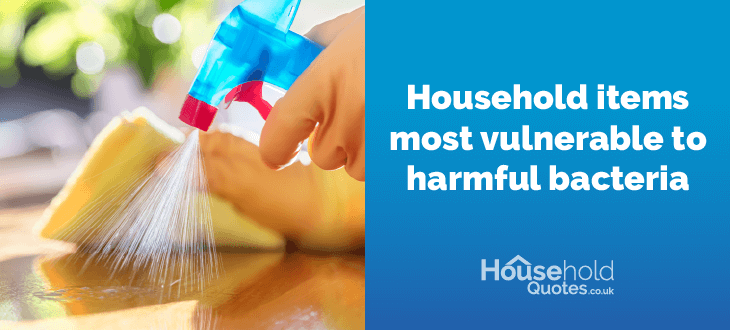- Householdquotes.co.uk
- Blog
- The household items most vulnerable to harmful bacteria
The household items most vulnerable to harmful bacteria


We all want to live in a clean home; it makes us feel better mentally and benefits our physical health. However, some household items are particularly vulnerable to the build-up of bacteria without the homeowner's knowledge.
This is common in spaces where you prepare or consume food, like your living area and kitchen. You must be aware of these items, as not doing so can result in illness.
To help you, Joshua Houston, Property Expert at Household Quotes has revealed five household items that are unknowingly vulnerable to harmful bacteria.
1: Kitchen sponge
When it comes to washing up, you have to use a sponge to ensure your dishes and utensils are nice and clean. However, this leads to nasty bacteria being transmitted to the sponge which will be used on every single piece of equipment. So change your sponge regularly, ideally every week. It should also be rinsed out after every use to make sure it doesn’t become nasty.
2: TV Remote
Surprisingly, television remotes are one of the dirtiest items in your home. Studies have shown that over time a remote can contain fifteen times as much bacteria as the average toilet seat. This is down to people eating whilst watching the TV, as well as not regularly washing their hands. Due to this, bacteria builds up over time leading to mould appearing. To clean your remote, use alcohol wipes, but ensure the batteries are removed first to avoid danger.
3: Smartphones/Tablets
Smartphone screens are a common way for bacteria to get into your home. When you’re in public you’ll be touching buttons, rails and doors whilst also using your phone. It’s estimated that around a third of people never clean their screens, so the risk of transference is great. Like with a TV remote, you can use alcohol wipes to clean your phone, just make sure your phone is turned off.
4: Refrigerators
The importance of a fridge when it comes to food storage is common knowledge, but what many people don’t know is bacteria can easily build up here. Food and drink can leak and if not properly cleaned it can be left in the fridge for weeks on end, allowing mould to form. This is extremely dangerous as there is a high chance that the bad bacteria from the outdated food could be transmitted onto the fresh food you’re planning to eat. You should aim to clean out your fridge at least once a week.
5: Countertops
Countertops come into contact with many different things, including food, hands and kitchen equipment. All of which have the potential to pass on bacteria if someone unknowingly touches the surface. Hands are the most common cause of cross-contamination in the kitchen, so wash your hands regularly to ensure good hygiene. Disinfect your surfaces at least once a day, ideally after you’ve prepared food.
Joshua Houston, Property Expert at Household Quotes:
‘’Many people are unaware of the nasty bacteria that is lingering in their home. It's important that you take time to clean these household items regularly.
Not doing so can result in you becoming sick. You could easily transfer the bacteria into your food, and if consumed can result in sickness and diarrhoea.’’

Josh Houston is a writer at Household Quotes whose passionate about the world of renewable energy, energy saving solutions and home improvements. He specialises in providing useful tips that our readers can adopt for their own needs. His skills involve translating complex topics to something more understandable.
